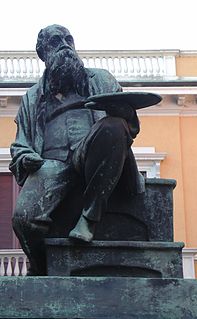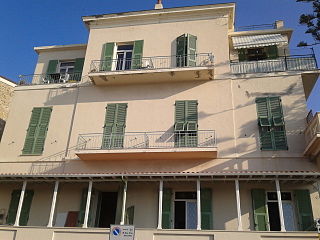Life and career
Piana shows from an early age a strong aptitude for painting. It was Ernest Meissonier who, during one of his stays in Bordighera at Villa Garnier, recommended to his parents to make him study arts. In 1882 Giuseppe Ferdinando Piana moved to Turin to study all'Albertina Academy where he had as professors Francesco Gamba and Andrea Gastaldi. [1] It is in Turin that he made his first paintings: "A ponenete di Bordighera, campagna ligure", "Politica rustica" and in 1898 "Studio d'artista" that will be purchased by the government.
In 1903 he moved to Sesto San Giovanni, he exhibited at the Permanent show in Milan where he presented "Peace", which received unexpected praise. In 1906 he was invited to the National exhibition in Milan where he presented "Cortile dei leoni a Granada", "La danza delle olive" and "Mare dopo la pioggia". The latter two paintings were purchased by the Galleria d'Arte Moderna (Milan). [2] In 1919 he participated in the Quadrennial Turin presenting "Ultima onda" and in the same year he became a member of the prestigious Brera Academy.
Besides painting, he also studied the fresco technique and Queen Margaret commissioned him one for Villa Etelinda. Having lived in Bordighera he got to know all the local artists of his time, including Charles Garnier, Mosé Bianchi, Hermann Nestel, Friederich von Kleudgen, Giuseppe Balbo and Pompeo Mariani. This last one will be one of his closest friends and he'll introduce Mariani to Marcellina Caronni, who will then become his wife. [3]
Piana always devoted a special attention to the colors of Bordighera and of the neighboring countries, demonstrating the technique of watercolor and oil, in particular for vivid glimpses of the rich vegetation, landscapes and bright sun. He became the personal professor of the Queen Mother and met De Amicis of whom he made a portrait during his stay in Bordighera.
Several exhibitions of his paintings were organised, including a particularly rich one in 1954 at the Palazzo del Parco in Bordighera and a very significant one for the type of works on display at the Gallery Bolzani Milan in 1968. [4]
Among his favourite students was the most beloved Fernando Pelosini (1901-1982) to whom he left all his painting material. [5] Giuseppe Ferdinando Piana died in Bordighera in 1956 at the age of 92.

Bordighera is a town and comune in the Province of Imperia, Liguria (Italy).

Giuseppe Pellizza da Volpedo was an Italian divisionist painter. He was born and died in Volpedo, in the Piedmont region of northern Italy.

Pelagio Palagi was an Italian painter, sculptor and interior decorator.

Mosè Bianchi (1840–1904) was an Italian painter and printmaker.

Pompeo Mariani was an Italian painter.
Cherubino Cornienti was an Italian painter, active in a Romantic style mainly in Northern Italy.

Giuseppe Amisani was an Italian portrait painter of the Belle Époque.
Giuseppe Riccardo "Beppe" Devalle was an Italian painter and collagist, acknowledged as one of the most interesting and highly appreciated artists of the last few decades of Italian painting. He always refuted the prevailing trends of the day so as to create and distinguish his own individual style: this may explain why Devalle has often been overlooked and placed as something of an outsider. He has been known as a master of photomontage and defined as a creator of the 'New Epic Italian style'.

Salvatore Mangione, known as Salvo, was an Italian artist who lived and worked in Turin.

Baron Friedrich von Kleudgen, sometimes known by his nickname Fritz, was born in Germany and studied painting in Weimar. He later moved to the Academy of Art Dresden where he met Adrian Ludwig Richter. Like many artists of his time, he visited Italy, with extended stays in Naples and Venice.

Giuseppe Balbo was an Italian painter.

The Villa Mariani is located at 5 Via Fontana Vecchia in Bordighera on the Riviera in the province of Imperia, in northern Italy near the French border.

The Town hall of Bordighera is located at 32 Via XX Settembre in Bordighera, Liguria.

Eugenio Quarti (1867-1929) is an Italian furniture maker called "the goldsmith of furniture makers".

Guido Seborga, pseudonym of Guido Hess, was an Italian journalist, poet, painter and writer.

Michele Catti was an Italian artist, considered one of the most important Sicilian landscape painters of the Belle Époque.
Giuseppe Biagi is an Italian painter and member of the Metacosa Movement.

Giuseppe Palanti was an Italian painter, illustrator, and urban planner, best known for his portraits, notably of Mussolini and Pius XI. He had a long collaboration with Teatro alla Scala in Milan, creating costume, set design and advertising material for multiple opera productions. He was also a major contributor towards the development of the seaside resort Milano Marittima.

Alessandro Mazzucotelli was an Italian craftsman, particularly known as a master ironworker and decorator. A specialist in wrought iron, Mazzucotelli linked his fame to the decorations of the works of the major exponents of Art Nouveau in Italy and abroad.
This page is based on this
Wikipedia article Text is available under the
CC BY-SA 4.0 license; additional terms may apply.
Images, videos and audio are available under their respective licenses.















